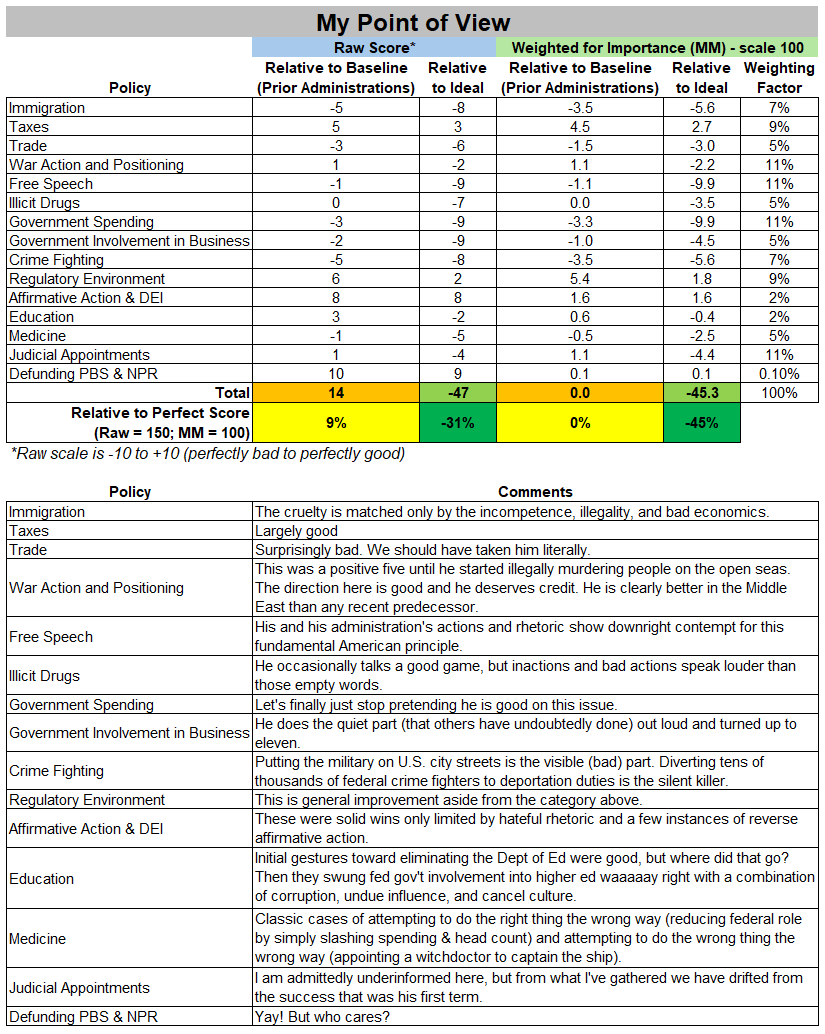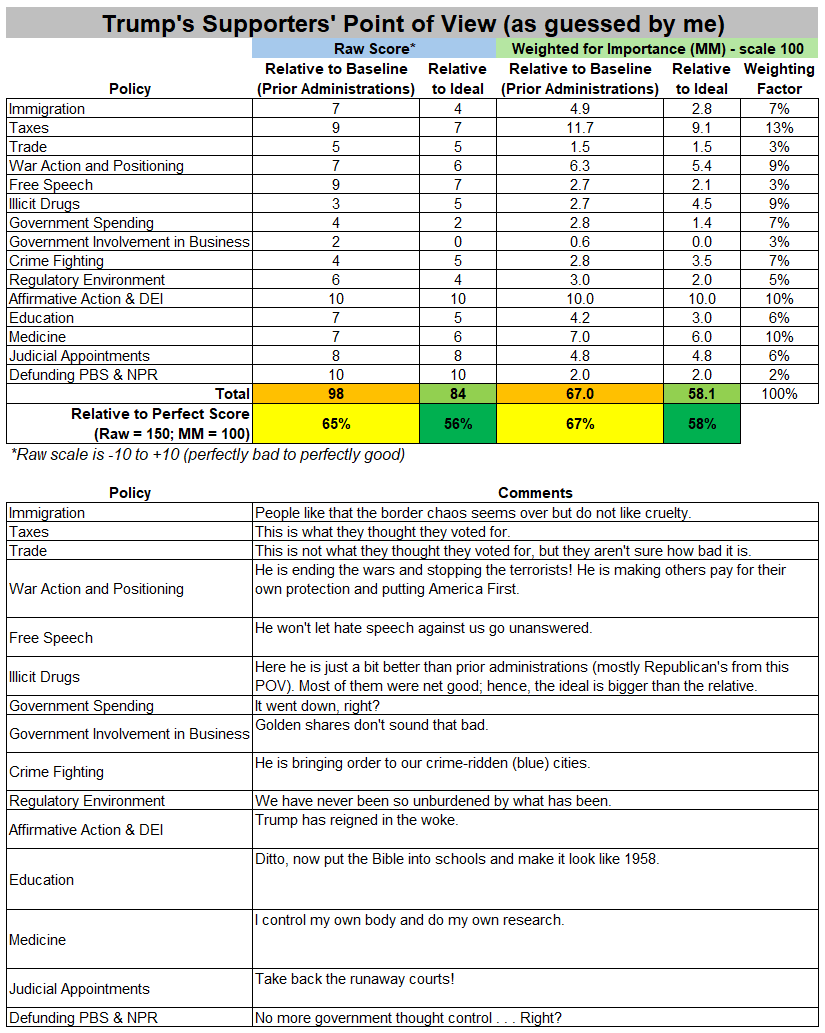When it Comes to Public Policy, Magnitude Matters
But Gorsuch! . . .
I’m told I focus too much on the negatives of the Trump administration while neglecting the wins. They say, “You’ve got to take some good with some bad. What matters is the net progress—advancing the football, so to speak. Besides, politics is a bundle.”
Consider the following policy partial list, which is in no particular order as will become clear shortly.
Immigration
Taxes (excluding tariffs)
Trade (tariffs and general environment)
War Action (taken & averted; the recent illegal murders by our military on alleged drug smugglers fall into this category rather than down below) and Positioning (reducing the U.S. role & increasing foreign contributions)
Free Speech
Illicit Drugs (drug war activity along with changes to the social and personal impact of drugs)
Government Spending
Government Involvement in Business (crony capitalism, etc.)
Crime Fighting (for lack of a better term; putting troops on the streets, etc.)
Regulatory Environment
Affirmative Action & DEI
Education
Medicine (FDA, vaccines, etc.)
Judicial Appointments (this term)
Defunding PBS & NPR
As I look at the wins and losses, it looks to me like its a few steps forward and about 20 leaps back. Even by Trump’s own stated objectives—taking them at face value rather than seeing through to the fact that corruption is the goal—he seems to be losing more than winning.
I’m planning a future post where I explicitly look at how much “winning” we are getting tired of. In it I will be evaluating Trump’s second administration on his own terms—looking at what the statistics say in the policy positions and outcomes he emphasizes.
For now let me interrogate the above list in two different ways for wins and losses: one from my point of view and one from Trump’s supporters’ point of view. I’ll add some vague gauge of magnitude while admitting that the supporters’ list itself is presumptuous of me so the magnitude grading is highly suspect.
These are evaluated from a directionalist rather than destinationist perspective. Getting better is positive improvement even though we are streets behind where it ultimately should be.
First is my point of view. Keep in mind that these are very ad hoc and quickly approximated. This is not by any means my final, refined thoughts, but I believe it appropriately captures my point.
Quibble with my answers as you might, and feel free to do your own scoring at home. The conclusion probably stands—verily, the wins are small potatoes and the losses are big meatballs.
Analyzing my scoring one finds that while being far from perfect in the raw score (14 and -47 or 9% and -31% when looked at as a percentage of perfect—out of 150), Trump is meaningfully worse adjusted for magnitude (going to 0.0 and -45.3 or 0% and -45% as a percentage of perfect—out of 100 in that case). One interesting observation is that relative to baseline I have Trump as a net positive/flat performer (the 14 and 0.0 figures). This corresponds to my attempt a year ago to score the two candidates. Realize, less bad is still bad. And two categories, AA/DEI & PBS/NPR, are doing almost all of the work here. Taxes and regulation are positives. The rest are flat or negative. Reigning in DEI and defunding state broadcasting are big wins, yet . . . say it with me . . . magnitude matters.
In the big picture defunding PBS & NPR are blips on the radar. Hence, I have them weighted at 0.1%. So, the raw score is inevitably misleading.
Also, THIS WAS A PARTIAL LIST. Don’t take the score and proclaim it truth. Just learn from the general result.
Next is Trump supporters’ generalized point of view. Keep something in mind as I risk committing the fallacy of the illusion of asymmetric insight (claiming to know more about others including their motives than they know themselves). My estimation of magnitude, the weighting factor, for supporters is an attempt to reflect the reality rather than the misperception of impact/value. In other words, you can think all you want that defunding NPR was the most momentous policy since the Magna Carta. You’re just by yourself in LaLa Land in doing so. These weighting factors attempt to reflect supporters’ preferences but not their misinformed biases.
I don’t want to spend too much effort “analyzing” this hypothetical Trump supporter proxy. I think it is generally accurate, but who knows. I do think it can be compared to my own to understand differences.
Notice how when scaled for magnitude, the Trump regime gets worse in my estimation but better for the hypothetical supporter. My general contention is that Trump supporters see things MUCH more positively than I do. That isn’t surprising or controversial. What might be somewhat surprising is how the improvement isn’t that substantial for supporters. Relative to prior administrations, Trump goes from a 98 out of 150 (65%) to a 67 out of 100 (67%). When compared to their ideal, he goes from 84/150 (56%) to 58.1/100 (58%). That gets to the essence of my point: The way you feel about these policy positions must be scaled to how impactful they really can be. Not every issue is THAT important.
Beyond that, I’ll make the following contentious claims:
Trump supporters are putting their thumbs on the scales (up or down depending) so as to exaggerate the impact his policies are having.
Trump supporters are ill-informed about Trump’s policies unaware of the negatives or arguments against.
Trump supporters are being disingenuous in their evaluation of Trump’s policies and their impact.
On that third point, one way to smoke out a Trump supporter’s real motives and opinions is to think about how they’d react if Biden or some other Democratic administration did the same thing. If they would be shocked but happy, it is a policy they actually do support. If they would be angry (apoplectic usually), then they are lying about supporting the policy when Trump does it.
Here is where cognitive dissonance comes into play. Most Trump supporters are blissfully unaware of where he is running afoul of their desires. Government spending is a case in point. I assume most supporters really think DOGE cut meaningful amounts from the federal budget.
One objection is to ask why I haven’t done the analysis for a general Trump opponent—assuming I don’t qualify. Well, they would have largely inflated, negative scores and corresponding magnitudes assigned. So it isn’t hard to imagine. But more importantly, they aren’t in power.
A Trump opponent will characteristically exaggerate how bad he has been, which seems hard as bad as he’s been. Yet the point has already been made—how much public policy matters is relative to baseline and ideal case comparisons and both should be adjusted for magnitude.



